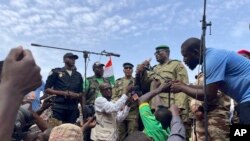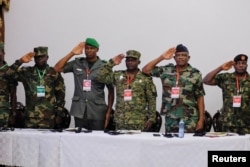Three weeks into the coup in Niger, the military junta continues to cling to power while West African army chiefs held a second day of talks on Friday in Ghana's capital, Accra, where they are mapping out a possible military intervention if diplomacy fails to reinstate Niger’s deposed President Mohamed Bazoum.
Rida Lyammouri, an analyst who has done a lot of field work in the Sahel/Lake Chad Basin, says the West African bloc, ECOWAS, is in a difficult position trying to discourage coups in the region but grappling with whether diplomacy or military intervention is the best deterrent.
“At the moment there are still some divisions in terms of the military intervention not only between ECOWAS and the African Union but also among the ECOWAS members, as well as the position of regional members that are excluded from these meetings who are currently run by junta, - like Mali, Burkina Faso, Guinea,” said Lyammouri.
Lyammouri, also a senior fellow at the Policy Center for the New South, a Moroccan-based policy research firm in Washington told VOA, a military intervention could not only be catastrophic to Niger but also to other countries in the already volatile region. And, he says, it could spill over beyond the Sahel.
“I think North African countries do have a role to play in terms of their diplomatic effort - because North Africa should be and would be concerned if there’s a military intervention because of borders, Algeria specifically but also there are lots of economic and diplomatic ties between North Africa and Niger and West Africa in general. Morocco has a lot of economic interest with Niger in terms of food security - telecom, insurance, banking, etc,” said Lyammouri.
Emira Woods is the executive director of the Green Leadership Trust and also a fellow at the Institute for Policy Studies. She applauds the recent efforts by regional religious leaders who visited Niamey.
“We had an incredible engagement of faith leaders coming from the region to Niger, stepping forward to say war is not the answer, to say diplomacy must be first and foremost to find a path to the democratic process,” said Woods.
Woods says it is time for African unity and directly points the finger at the West.
“What we have before us is an incredible juxtaposition of the international community with its interest and focus on resources, particularly the uranium that’s in Niger, and building up military forces, training and equipping those military forces,” said Woods.
Most Western countries have condemned the coup and have thrown their support behind efforts by the African Union and the ECOWAS bloc.
Niger holds strategic economic and geopolitical significance internationally. Uranium and oil, two natural resources plentiful in Niger, are sought after in the international commodities market. And under President Bazoum, the country was a big ally to the West in the fight against insurgency groups in the region linked to al-Qaida and the Islamic State group.
Junta leaders have justified toppling the democratically elected president because they accused him of not handling rampant insecurity in some parts of the country. On Wednesday, 17 of its soldiers were killed in an ambush by insurgents about 60 kilometers from the Nigerien capital, Niamey, in an area that borders Burkina Faso.
“What we have is an undermining of peace and security in the region that goes back to - the ouster of [Moammar] Gadhafi in Libya and the flow of weapons into Libya, and then from Libya throughout the region in the Sahel. What we have is a steady equipping of military actors and literally laying the groundwork for these military actors to gain power, strength, visibility and legitimacy in a way that has emboldened them to launch coups - from Mali, Burkina, to now Niger and of course you have a similar situation on the other side of the Sahel, in the Sudan region,” said Woods.
Sudan’s two rival generals have been engaged in a brutal war against each other the past four months, with no end in sight.






